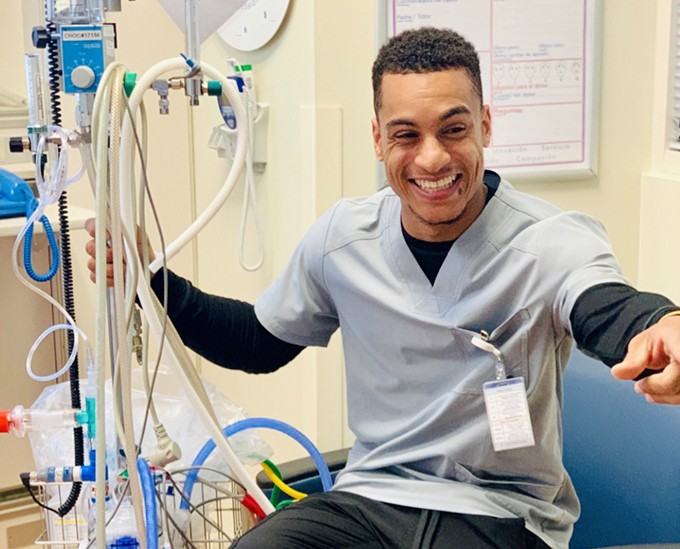My Specialty
Pediatric CICU, Roosevelt Davis, Children’s Hospital of Orange County
From the football field to bedside nursing

Roosevelt Davis, RN, MSN
Pediatric Cardiovascular Intensive Care Unit
Children’s Hospital of Orange County
You had a very unusual and fascinating path to a nursing career. What were you doing prior to entering nursing school?
When I first arrived at UCLA, my main interest was playing football. Since I entered the process a little late, all of the scholarships had already been spoken for. I was able to enter as a “preferred walk-on,” meaning that if I maintained good grades and played well, I’d get a scholarship for the following year.
My brother was also playing on the football team, but he had to stop when he tore his ACL and MCL. That completely changed his journey, and it made me realize that anything could happen.
As my football career at UCLA continued, my coach kept encouraging me to look beyond professional athletics. He wasn’t a coach who felt that football had to be your life 24/7; he said that playing sports was great, but you also had to take care of business in the rest of your life. That had an effect on me.
What happened next?
I had an ankle injury during my otherwise successful football career, and getting hit in the head a lot wasn’t really fun. It made me realize that I needed to explore what else I could do if football didn’t work out. I wanted to see how I could make a difference in the world.
I went to a few career fairs and the career path that most caught my eye was nursing. I did some research and realized I could finish the nursing prerequisites (most of which I did at Santa Monica College), graduate with my bachelor’s degree in political science and then just turn around and apply to nursing school.
Why did you choose nursing?
Healthcare was all around me. My nana was high up in the healthcare world. My aunt is also a nurse, and my stepmom is actually a nurse at UCLA. Meanwhile, my mom works on the legal side of healthcare; she was the one who taught me about the importance of documentation in nursing and patient care. Even my dad had some pharmacy background in school.
What was nursing school like for you?
As an African-American man and a college athlete, I was honestly really scared the first day I walked into that classroom. In a class of 70, there were only three Black men, including me, and a handful of Black women. There were about 10 men overall.
I was so afraid of being different from everybody else. On a football team, you’re around people you know and who know exactly what you do because you all play the same game and share a common goal. However, I very quickly realized that my fellow students welcomed me without any judgment. Now, I have friends for a lifetime.


